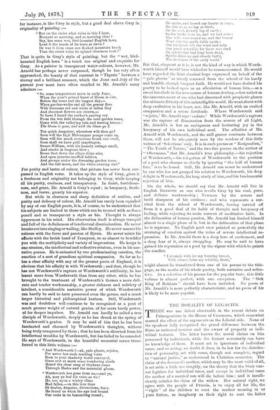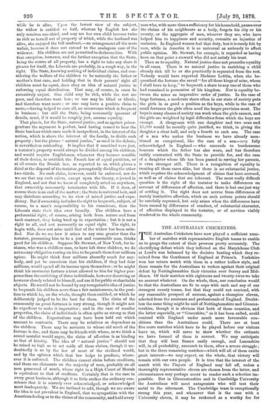THE MORALITY OF LEGACIES.
THERE was one defect observable in the recent debate on Primogeniture in the house of Commons, which somewhat marred the effect of the arguments on the Liberal side. None of the speakers fully recognised the grand difference between the State as universal testator and the owner of property as indi- vidual testator. The latter knows the moral claims on him possessed by individuals, while the former necessarily can have no knowledge of them. It must act in ignorance of individual cases, and so acting, no doubt it does, in its law for the distribu- tion of personalty, act with some, though not complete, regard to "natural justice," as understood in Christian countries. The claim of the deceased's mother, which may be the most valid of all, is set aside a little too roughly, on the theory that the State can- not legislate for individual cases, and except in individual cases the mother of a married son will die before him ; and it insuffi- ciently satisfies the claim of the widow. Her natural right, we agree with the people of Prussia, is to enjoy all for life, the " right " of the children to oust the mother seeming to us pure fiction, as imaginary as their right to oust the father
while he is alive. Upon the lowest view of the subject, the widow is entitled to half, whereas by English law she only receives one-third, and may see her own child become twice as rich as herself out of property of which, while the husband was alive, she enjoyed the full usufruct,—an arrangement all the more unfair, because it does not extend to the analogous case of the widower. His children are not permitted to dethrone him. With that exception, however, and the farther exception that the State, being the source of all property, has a right to take any share it pleases for itself, the Liberals are probably, in a rough way, in the right. The State, knowing nothing of individual claims, and con- sidering the welfare of the children to be naturally the father or mother's first care, and holding that in their parents' sight all children must be equal, does obey an idea of natural justice in enforcing equal distribution. That may, of course, in cases be excessively unjust. One child may be rich, while the rest are poor, and therefore want less ; or one may be blind or idiotic, and therefore want more ; or one may have a positive claim to more,—having helped to earn all, an occurrence which is frequent in business ; but still the State, being necessarily ignorant of details, must, if it would be roughly just, assume equality.
That plan is, for the State, natural justice, and as against primo- geniture the argument is perfect, land having ceased to bear the State burdens which once made it inexpedient, in the interest of the nation, which is above the interest of the family, to divide such property ; but the phrase " natural justice," as used in the debate, is nevertheless misleading. It implies that if mankind were just, a testator's property would always be divided among his children, and would require Englishmen, whenever they became sensible of their duties, to establish the French law of equal partition, or at all events the Danish law, as reported to us, which places a third at the disposal of the testator, peremptorily dividing the other two-thirds. No such claim, however, could be enforced, nor do we see that any such exists, except upon the theory, rejected in England, and not that we know of completely acted on anywhere, that ownership necessarily terminates with life. If it does, of course there is an end of the matter ; the State is universal heir, and may distribute according to its view of mixed justice and expe- diency. But if ownership includes the right to bequeath, subject, of course, to a man's responsibility to his conscience, then the Liberals state their idea over broadly. The children have a preferential right, of course, arising both from nature and from tacit contract, they being bred up in expectation ; but it is not a right to all, and not necessarily an equal right. The right, to begin with, does not arise until that of the widow has been satis- fied. Nor do we see how it arises to any sum greater than the testator, presuming him to be a just and reasonable man, thinks good for his children. Suppose Mr. Stewart, of New York, for in- stance, who was a childless man, to have left three children, we do not see any obligation resting on him to bequeath them four millions apiece. He might think four millions absurdly much for any- body, and yet be conscious that his children, if they had four millions, would spend all its income upon themselves ; or he might think his enormous fortune a trust allowed to him for higher pur- poses than the enriching of three individuals, however deserving or however closely related to himself, and use it forpublic or charitable objects. He would not be bound by anyrecognisable idea of justice to bequeath his children more than a fair maintenance, in the posi- tion to which he, on the whole, thought them entitled, or which he deliberately judged to be the best for them. The claim of the community on great fortunes is very strong, though it might not be expedient to make it imperative ; and in the case of smaller properties, the claim of individuals is often quite as strong as that of the children. Expectations may have been held out which amount to contracts. There may be relatives as dependent as the children. There may be servants to whose aid much of the fortune is due, and there may be friends with whom, as we think a sound moralist would argue, the claim of affection is as binding as that of kinship. The idea of " natural justice" should not be raised so high as to set aside all these claims, though it un- doubtedly is so by the law of most of the civilised world, and by the opinion which that law helps to produce, where- ever it is enforced. The children cannot claim before creditors, and there are claimants on the majority of men, probably on all men possessed of much, whose right in a High Court of Morals is equivalent to that of creditors. Certainly that is the case in every great business, although it so little strikes the ordinary con- science that it is scarcely ever acknowledged, or acknowledged most inadequately. We are inclined to add, though we are aware the idea is not prevalent in England, that we sympathise with the American feeling as to the claims of the community, and hold every man who, with more than a sufficiency for his household, passes over the claims of his neighbours as a body, forgets his city or his county, or the aggregate of men, whoever they are, who have helped him to happiness and security, commits an injustice of omission. In England women feel that duty, but it is rarely felt by men, while in America it is so universal as seriously to affect public opinion. Mr. Stewart, for example, is regarded as having been on that point a steward who did not satisfy his trust.
Then as to equality. Natural justice does not prescribe equality in all cases. There is no natural justice in enriching a child already rich till he or she practically is separated from the rest. Nobody would have expected Madame Letitia, when she be- queathed the fortune she saved " for all these kings of mine, whom I shall have to keep," to bequeath a share to any one of them who had remained in possession of his kingdom. Nor is equality be- tween the sexes an imperative order of justice. In the case of large fortunes, a moderate share often in our state of society puts the girls in as good a position as the boys, while in the case of small fortunes the girls often need the larger provision most. The boys in many classes of society can work when the girls cannot, and the girls are weighted by legal difficulties from which the boys are exempt. A clergyman with one daughter and two sons and £5,000 would be morally quite justified, we think, in giving the daughter a clear half, and only a fourth to each son. The case of a son who makes the business we have already men- tioned as exceptional, like the case of a son—very fully acknowledged in England — who succeeds to burdensome honours which the father has also worn, and has therefore tacitly contracted with the State to provide for, and the case of a daughter whose life has been passed in serving her parents, is even stronger still. There is a recognition of equality in treating all these cases alike, but there is no substantial justice, which requires the acknowledgment of claims that have accrued, as well as of claims that are inherent. The most really difficult question is the right of the testator to make differences on account of differences of affection, and there is but one just way of settling it. The right does not accrue from differences of merely instinctive affection, which on such serious points should be carefully repressed, but only arises when the differences have been caused by differences of conduct, of substantial character, of affection displayed to the testator, or of services visibly rendered to the whole community.



































 Previous page
Previous page